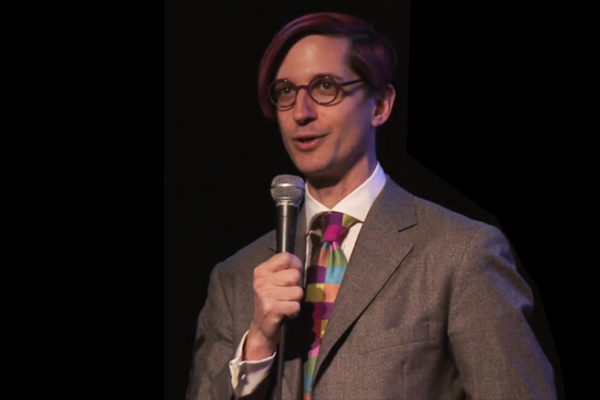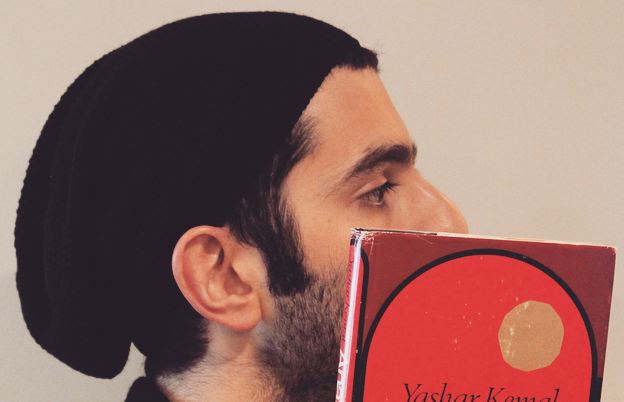On a rainy afternoon in Midtown, I ordered a cup of coffee and waited to meet Jesse Sheidlower, lexicographer and the former editor-at-large of the Oxford English Dictionary, as well as the Historical Dictionary of American Slang. Jesse is also the co-owner of a semi-secret high-end cocktail bar in Brooklyn, and one of New York Magazine’s 100 Smartest People in New York. He has assured me he won’t be hard to spot. He’ll be the one with purple hair. When a dapper gentleman in pressed slacks, rimless glasses, and, yes, a styled violet coif, enters Le Pain Quotidien, I have no trouble believing that this is the same man who wrote The F Word, a tome on the history, reputation, and ever-evolving usage of that certain four-letter profanity. I wave him over and we settle in for a casual Q-and-A.
ES: So, I read on your website that you hate “about me” sections. I guess this as good a time as any to discover what you really are, about. You’re a lexicographer – the whole concept of what you do is fascinating to me. So tell me about your earliest experiences with words and language, and where the interest really began.
JS: I don’t have a specific anecdote. I was always interested in words. I never thought that this would be anything, it was just an interest, just a hobby really, the way lots of people find words interesting. The idea of working for a dictionary never occurred to me. It never occurs to anybody. There’s one lexicographer I know of who thought that she wanted to be a lexicographer. Everyone else, it just sort of landed in their lap some way or another. It was being in the right place at the right time. It was the exact right time, because the history of American lexicography for most of the century involves publishing a college sized dictionary, sacking most of the staff, publishing it for a number of years without making any changes, or making extremely minor changes, to update the copyright page. Then, hiring a bunch of people back, spending two or three years working on a new dictionary, publishing a new dictionary; lather, rinse, repeat. So this is how things worked from, let’s say, the 1940s to the early 1990s. I arrived at Random House at the very end of this last cycle, when most of the staff had left, and the people who remained were not really good at doing publicity or outreach. Despite being pathologically shy at the time, I found that I was actually fairly good at this. So I ended up getting a lot of attention, more or less undeservedly, because I hadn’t been doing this very long, but I just happened to get into the right place at the right time. And it was a very good time for people starting to use computers in lexicography.
ES: Tell me about the significance of that – computers and sharing information digitally.
JS: The important thing, in terms of the publishing of dictionaries as opposed to the research, was the online typesetting model. It used to be that you had to set everything by hand, and then if you wanted to change a page you had to literally find the line on the page, adjust the type, and add something. This is an enormously time consuming, difficult thing. But around then, late ’80s, early ’90s, was when computerized typesetting really became the thing. So, in fact, you could come out with a new edition of the dictionary without going through masses of printing fees. There’s really one, two American dictionaries left, and their physical manifestations barely matter.
ES: How much does the dictionary change, year to year?
JS: Not much. It’s just that now, you can publicize it. Anytime a dictionary talks about new words, there are a million articles and blogs and everyone is posting about what this means for American culture. Back then, this didn’t happen at all. The only time this would happen was when you had a new edition every ten years. So in a short amount of time it went from that once-in-every-ten-years marketing model, to a yearly marketing model.
ES: But I have to imagine that a lot of neologisms of the nineties and early aughties were more than just a faster spread of information via the internet-
JS: Not really. There are always new words coming in. In fact, there was a study done based on OED evidence where people examined the semantic realms of words that entered the dictionary from 1750 to 1755, 1550 to 1555, and 1950 to 1955. The proportions of technical terms were almost exactly the same.
ES: Oh wow, that’s very surprising.
JS: In every era there were technological words that were important. Now, what’s happening is that words can spread much faster. It can happen instantaneously. But in terms of the kinds of words, it’s not as big a difference as you think. Although, some dictionary publishers might spin that deliberately, like, “look at all our new tech terms.” Even though you also have a bunch of new food terms, and a bunch of new clothing terms, and a bunch of new, any other category at all. Every quarter there’s a new OED update. It will list all the words and sentences added to that edition. The marketing for that will also pick out the interesting words and phrases. But if you look at the entire list, you will see the ones that are not pulled out for marketing purposes, and there’s a huge range.
ES: How long can you, personally, read a dictionary without getting exhausted? I’m just thinking of semantic satiation, and after reading the same sounds over and over, I’m going to just black out after a while.
JS: Well, it’s very difficult. The tendency is to look at a definition and just accept it, and not start thinking hard about what the problems are, what are the good things, what am I missing, how could this be better? So, most professionally written definitions look good on paper. Unless you think about it really hard, you’re going to miss things that might muddle the definition. If you’re burning out, that’s the kind of thing that tends to happen. You look at it and think, oh, this seems pretty good, and go on to the next thing without thinking, wait, is it really good?
ES: So it’s almost like the philosophy of language.
JS: Yes, it’s entirely philosophy.
ES: In terms of coining new words, I think of Lewis Carroll, Shakespeare, the greats. Do you know of any modern writers who are forming neologisms? And, must it be accepted as slang first?
JS: No, absolutely not. Also, the notion of important writers as coroners of new words is overstated. ES: Again, surprising! JS: The number of new words Carroll coined is relatively small, and we know them because they’re so obviously coinages of his, so they’re very prominent. Shakespeare is a complicated case, there’s actually been a lot of work done on this lately. Shakespeare is the first known user of a lot of words, but, many of these are now being backdated, as we do more research, to other authors. Now, you can use computers to do this. So, you know, anything you’ll now look up in full text databases, and it turns out that some author you’ve never heard of, that no one ever read because it’s boring, or a 400 year old religious draft; it turns out they’ve used the same words long before Shakespeare. Which is not to diminish the importance of Shakespeare as a writer, but the notion of Shakespeare as a word coiner is largely driven by other cultural references and imports than marketing, again.
ES: In terms of slang, I know you worked on the slang dictionary. How often and where do you think a word has to appear to be considered accepted slang?
JS: Whether or not something is slang has absolutely no bearing on its acceptability. This is a common misconception, that in order to go into a dictionary, and be “official,” that a word has to have some grammatical acceptability, or not be vulgar. None of this is true. If a word is out there, if a word is being used, it can and probably will go into the dictionary.
ES: And then, neologism.
JS: Right. But, you don’t exclude things because you don’t like them for whatever reason. Not only are there concepts that are very important but we don’t have words for them, but there are ones where people have been discussing for hundreds of years the fact that we lack a word for it. The canonical example of this is the search for an epicene pronoun, a non-gendered, third person singular pronoun. This is a trend that actually started 300 years ago, and is still without a solution. The words you actually need? Language doesn’t work that way.
ES: So, is it safe to say that some words are never actually developed because they refer to topics that some people are uncomfortable discussing?
JS: Well, it depends. For example, there’s no standard English term that is a non-formal, non-slang word for the act of defecating. Which is kind of astonishing. I mean, this is something every single person does on a regular basis. There’s no word for it. You can use a technical term like defecate, or you can say shit, or poop, or something else that’s either slang or highly colloquial. But there is no standard term you can use, because the concept itself is taboo. There’s no circumstance in which, you know, you’re at a formal dinner party, and you would ever talk about defecating, so therefore there’s no standard term for it.
ES: Along those lines…do you have a favorite slang word?
JS: In general lexicographers will always refuse to answer this, because all words are important. They’re all my children.
ES: Understandable. Can you pick favorite writers, then? People you think use language in an interesting way?
JS: David Foster Wallace. I think he’s a really brilliant user of language. Nicholson Baker. There’s a very big difference between talking to people who are writers, or claim to be fans of language, or who like words, or things like that, and what’s actually important to language. For the most part, the words that writers, etc., find interesting are more unimportant for the language. It’s been a big problem for dictionaries over time, because the people who write dictionaries are drawn to particular words, and people who review dictionaries like particular words. But the people who use dictionaries have no interest in these words. So if you ask word people the kind of words they like, you’ll get answers like “callipygian,” things like that. These are words that are so rare as to effectively not be a part of the language. They’re not advancing language.
ES: Do you think it’s a writer’s job to advance language?
JS: No, not necessarily. It depends what they’re doing. The job of certain writers is indeed to push language boundaries, – that’s the purpose of poetry. But the kinds of people who talk about language usually have one view of what it is. These people are highly educated, upper middle class from similar backgrounds. They don’t really consider that other people think same concepts in different linguistic terms. Dialects in American are divergent, not convergent. It’s certainly true that certain extremely esoteric regional dialects might be dying out. Most people, by which I mean the educated, think, well, surely everyone wants to communicate, and everyone wants to sound the same, no one wants to sound stupid or different. In fact, no. People want to sound like their neighbors, in general. There’s a longstanding notion that national TV will level dialect differences. No, people don’t want to sound like the newscaster. Even if they respect him, they don’t want to sound like him. If you started speaking like a newscaster, people might think you’re pretentious. So, even the existence of widespread, highly standardized language doesn’t mean that that’s what people are going to speak.
ES: So, even with the existence of standardized, dictionary-regulated language, that’s not necessarily what people will speak?
JS: Right. There’s the canonical example, for dictionaries, of heraldic terms, or parts of armor. Almost everyone who likes dictionaries think these words are really cool. They want to spend a lot of time researching heraldic terminology. But if all heraldic terminology vanished from the face of the Earth tomorrow, it would make no difference aside from a few dozen people in the world. This is something I was discussing with Jonathan Lighter, the editor of the Historical Dictionary of American Slang. He had entered some term, some highly technical term for some kind of item on an aircraft carrier. An American aircraft carrier has five thousand people on it. If every one of them knows this one term, even if it’s just a slang term for that one ship, that’s more people than know some term for, like, Greek rhetoric or whatever. That’s more in that one boat. But because everyone says, oh, no, this Greek rhetoric is an important term for philosophy, we have to put this in, even though it only appears in advanced philosophy textbooks. They’re ignoring things that are incredibly widely used just because they didn’t serve on an aircraft carrier, or don’t follow NASCAR, or do all of these things that other people do. The things that get covered are the things that people who are reading things, or publishing things, find interesting. One of the great things about the internet is that there is scope, all of the sudden, for people writing about all sorts of topics that had previously been esoteric.
ES: Let’s talk about obscene language. You did, in fact, write a book about the word “fuck.” How can obscene language, do you think, enhance the field of lexicology?
JS: All forms of language are important. There’s a tremendous amount that we don’t know about spoken language, about slang, about dialect, because it didn’t get written down, probably because no one cared, or because it wasn’t viewed as appropriate. Trying to reconstruct what we knew about these topics, in a past era, is very difficult. So in the example that I write about, there are very, very, very few written examples of the word “fuck” in 19th century America…. but we do know that it was common in speech. Therefore, to avoid using it when representing 19th-century speech is a mistake, because you’re misrepresenting the language of that time.
ES: What about food writing? I know you often review restaurants and cocktail bars, and I have to imagine that’s a totally different kind of writing with an entirely distinct set of terminology.
JS: Food writing is exceptionally difficult because describing food is something that’s really, really hard to do. The problem is our vocabulary for describing tastes in general is very poor. So, if you take one of those complainers about pretentious wine writing, and ask them to describe the taste of a grilled steak and sautéed onions without using the words steak, beef, onions, they’ll realize, hmm…you can’t do it. It’s incredibly hard to do. You’ll end up with something that doesn’t make much sense. So the questions is, if you wrote a description of the taste of grilled steak, and then gave it to someone else, could they tell you what you were describing? Some people write evocative things, or focus on things other than the food. Some people care about the entirety of the experience, and getting that into a restaurant review is an important, worthwhile thing. But, even talking about the food itself, it’s very difficult to just say either technical or evocative things about the food.
In light of his new semi-secret high-end cocktail bar in Brooklyn, I probed Jesse for recommendations on the best watering holes in the city. He likes places that specialize in classically themed cocktails, he said – Little Branch and the Clover Club, Amor y Amargo on 6th street.
JS: In general, I like inventiveness. I like experimentation. But with food and cocktails, it just needs to work. Molecular gastronomy has been a fad for a while now. There are a lot of places, that, ten years ago, were doing the whole “foam this,” and “emulsion that.” There were a lot of places doing it that simply weren’t good. There were still a few places that were doing it and were absolutely extraordinary. But just using some weird culinary technique doesn’t mean that it’s good or interesting or new. I think cocktails are like that. There are a lot of places around town where you have these things with a dozen ingredients, or these unusual ingredients you’d never guess.
Scene cut. Take two, a small, dimly lit bar somewhere in Brooklyn with space for only two guests and a bartender. My date and I sipped sweet, savory, aromatic, and complex cocktails with a velvet mouthfeel out of miniature goblets while soft jazz music played. The drinks were impossible to describe – classic but modern; easy but ambrosial. It’s not a new concept, this kind of culinary innovation, I realized. There have always been cuisines and cocktails breaking new ground in their respective eras. It’s only now, in the information age, as techniques and flavors and exceptional new bars gain notoriety in the public eye, that we’re aware of it.




